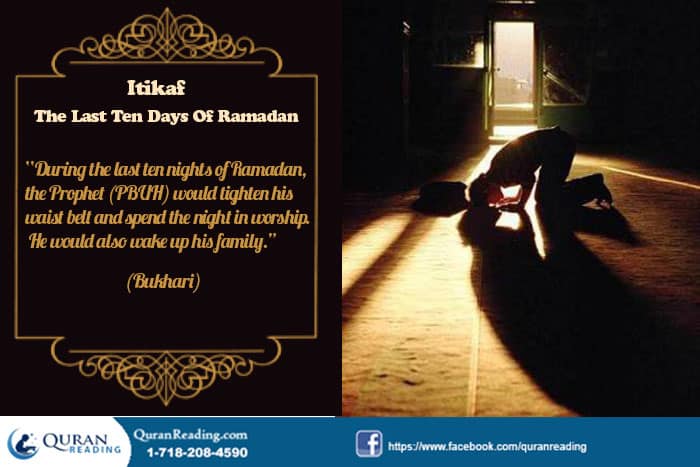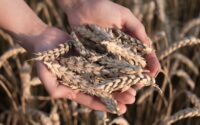
Itikaf, The Night Of Qadar And The Last Ten Days Of Ramadan

Ramadan is known for many things. It is known for the worldwide fasting for the whole month, which the Muslims observe from dawn till dusk every day. It is known for the increased influx of Muslims in the mosques to offer regular obligatory prayers in congregation. It is also known for the night prayer called ‘Taraweeh’, which the Muslims offer after the Isha prayer every day. In addition, it is the month in which Muslims tend towards the rewarded deeds the most to attain mercy and blessings of Allah. However, besides these there are few other things as well that are Ramadan specific and without which the mention of Ramadan is incomplete.
The other important feature for which Ramadan is known is the last sacred Ashra, the Itikaf and the Night of Qadr. These three elements are integral to Ramadan and without any of these, the mention of Ramadan cannot be complete. Although these elements are intertwined with each other, however, for the sake of clarity and the importance each one of them has they are discussed below individually.

Last Ten Days:
The month of Ramadan is distributed into three parts, ten days each. These tend days are called ‘Ashra’ thus, every Ramadan has three Ashras. The last ten days fall in the Last Ashra. Besides the distribution into ten days, the AShra is also given some religious significance as well in Islam. For instance, the first Ashra is for seeking mercy from Allah the second Ashra is for seeking forgiveness, while the third Ashra is for seeking protection from the fire of Hell. Thus, with the change in Ashra, a Muslim also change his or her intentions in supplication as well.
There are multiple reasons why the last ten days of Ramadan are given more importance than the rest of the two Ashras. The primary reason why it is of importance and given extra reverence is the fact that these are the last ten days of Ramadan. As soon as the end of Ramadan comes near, people start realizing that the blessing of Allah is ending and they don’t know whether they will live another year to see another Ramadan or not. Therefore, they start performing excessive prayers and try committing as much good deeds as possible to ensure greater reward. Hazrat Aisha (RA) narrated the routine of Prophet Muhammad (PBUH) in this regard in the following way:
“During the last ten nights of Ramadan, the Prophet (PBUH) would tighten his waist belt and spend the night in worship. He would also wake up his family.” (Bukhari)
From the hadith it is clear that the last ten days of Ramadan were when the Prophet (PBUH) would tighten up His waist and indulge in prayer. Moreover, these prayers are not limited to individual prayer, rather Prophet (PBUH) would also awake his family members and also encourage them to indulge in prayers as well. Ergo, in the last ten days a Muslim must make sure that the nights are spent in prayers and the days are spent in undertaking deeds of kindness and charity.
Recommended Reading – Tips and Blessings for The Last 10 Days Of Ramadan
Itikaf:
Itikaf is a part of the last ten days of Ramadan. In the last ten days of Ramadan, Prophet Muhammad (PBUH) would go into seclusion and He would spent the whole ten days in praying to Allah Almighty without any or minimal interaction with other humans. Hazrat Abu Huraira (RA) reports:
“Allah’s Messenger (PBUH) used to perform Itikaf for ten days every Ramadan, then when it was the year in which he was taken (died), he performed Itikaf for twenty days.” (Bukhari)
From this hadith it is clear that Prophet Muhammad (PBUH) would observe Itekaf on regular bases throughout His life and He never missed it. Hence, there is nothing wrong with observing Itikaf more than once during life. Moreover, the thing that becomes evident from this hadith is the kind of importance Itikaf had for Prophet (PBUH). Besides observing Ramadan on regular bases, He performed it for twenty days in the time when He was to leave this world. Ergo, every Muslim must try to observe Itikaaf on regular bases in which one must offer additional prayers and read and ponder over Quran to ensure that maximum reward is received during the days spent for worship and praise of Allah Almighty.
Recommended Reading – Itikaf – An Act of Worship for the Month of Fasting
Laylatul Qadr:
The third important element for which Ramadan is known across the globe and perhaps the most looked forward to occasion of the month is the Laylatul Qadr. It is the most blessed night in the Islamic year and the verses of Quran as well as the hadith of Prophet (PBUH) signify its importance. In Quran, Allah Almighty says:
“Verily! We have sent it (this Qur’aan) down in the Night of Decree (Lailatul-Qadr). And what will make you know what the Night of Decree is? The Night of Decree is better than a thousand months. Therein descend the angels and the Rooh (ie. Jibreel [Gabriel]) by Allaah’s Permission with all Decrees, Peace! until the appearance of dawn.” [97:1-5]
Therefore, in the last ten days of Ramadan are most crucial because of the presence of the Laylatul Qadr and every Muslim should try finding it and perform special prayers in these odd nights to ensure maximum reward form Allah.
Recommended Reading – The Night Of Qadar: Significance, Prayers And Worship
Conclusion:
In a nutshell, the last Ashra or Ramadan is perhaps the most important part of the whole month. In this month one gets to say goodbye to Ramadan, observe the great Sunnah of Itikaf and find and pray in the Laylatul Qadr, ergo, every Muslim must hold the last Ashra revere and appreciate what it entails for a Muslim.




